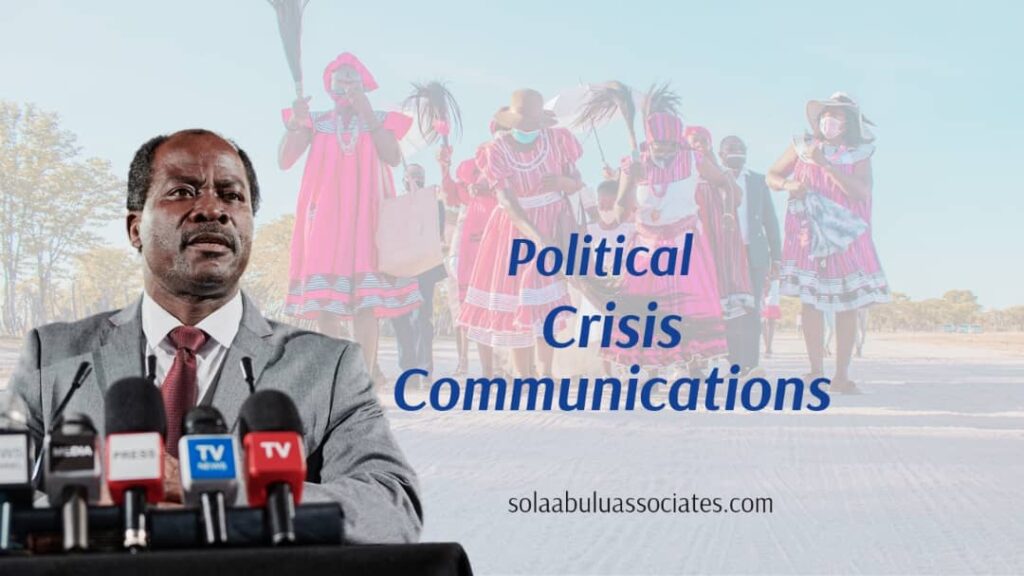Political Crisis Communication

Political crisis communications is as important as crisis communications in the business world, development sector or organizational context. However, the context of a political crisis differs. Political groups and their high-profile leaders are very prone to crisis from mismanagement of public expectation, needs and interest. Political leaders, groups and their communicators need to understand that power is not exclusively theirs but belongs to the people; therefore, a citizen-centric approach to communication is highly recommended. This is why the political context, audience and desired outcome makes the application of a crisis communication framework different.
“Strategic communications is the foundation in which 21st century world-class communications takes place” ~ Sola Abulu.
It becomes imperative that the frameworks of strategic communications be integrated into crisis communications, whether in the political sector, development sector, personal brands, etc. As earlier stated, because the context from one sector differs from another, while the framework used is the same, its application will differ.
How to communicate in a Political Crisis
- What is the overarching context?: Knowing the context ensures that your crisis communications strategy is not developed to solve an inexistent problem. The problem is not what you think or perceive it is. For political communicators to identify the nature of the problem, you should know what the external perspective is of the crisis on ground.
- Stakeholders: Who has a high interest and influence on the escalation of your crisis. The citizens/audience are major stakeholders in political communication but at this point, you want to find out who is exerting the most influence on others and raising interests. This is the person or parties to pay apt attention to in your political crisis communication strategy.
- What are your desired outcome: Ensure to state clearly what results you want to see after communicating. What do you want your stakeholders to know, how do you want them to feel about you, what do you want them to do with the communications effort you will push out.
- Narrative and sentiments: What a lot of people do wrongly that shows they are not adopting the strategic communications framework is, they begin with this step. This step comes after you know the problem, prioritized your stakeholders based on their influence and interest and clearly defined your outcome. Now, you want to know how far the negative sentiment is from the truth. Where there are various sentiments, it also important to be attentive to know this.
- Develop your communications strategy: Here, you determine the message, platform, etc., to be used. Watch this video to learn how to develop a communications strategy.
- Engagement strategy: Would the political leader or group involved in the crisis make use of a spokesperson or address stakeholders themselves? Is the crisis communications response going to adopt a proactive or reactive response? What is the timing and sequence? Are there third-party involvements or proof points?
- Metrics: The metrics to measure if the political crisis communication and messaging was effective are; media mention, penetration, change in perception, monitoring of conversation to see it de-escalates and the required action as stipulated in the earlier stage is achieved.
Before and during elections, political crises are often generated from campaigns while there can be other controversies post-election. A typical example of a political crisis is the political violence involving al-Shabaab in Kenya between January to September 2024.
In a political crisis, it is important to start by defining what the political context is. Without knowing what this is, the communications response would be devoid of strategy and full of assumptions. Understanding the context of a political crisis just as in any other crisis scenario is the first thing to do before engaging or responding to a crisis.
Did you know that our flagship courses are now accessible 24/7 to learners from around the world as Play On-Demand and pre-recorded course contents. Our Issues/Crisis and Reputation Management course is designed for working professionals and leaders, seeking to develop their knowledge, skill and competence in key areas of corporate, business, brand/marketing and public sector/political and policy communications. Register here to access this course on our e-Learning Management system.
……………………………..
Sola Abulu & Associates is a strategy and communications training and consulting firm focused on enabling businesses, brands and institutions to achieve their desired objectives through strategic communications and reputation management.
